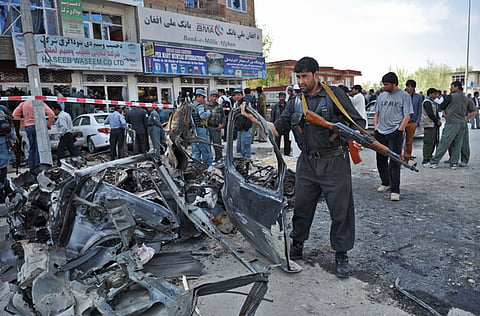Checkmating extremists
America should support Russian and Chinese interests in order to stop terrorist safe havens from popping up in the Afghanistan-Pakistan region

In the AfPak theatre — an American acronym used for the problem region of Afghanistan and Pakistan — two actors, Russia and China, are playing a dominant role in an effort to check the extremist violence emanating from that region.
Both Russia and China, worried over the region’s future after the US troop withdrawal from Afghanistan, have increased their military presence in Central and South Asia in order to keep the region free from becoming future terrorist safe havens.
Russia is strengthening its regional presence through the Collective Security Treaty Organisation (CSTO) which allows Russia a veto right to overturn a CSTO member state’s decision to host a foreign military.
However, CSTO members, particularly Kazakhstan, Kyrgyzstan, Tajikistan and Uzbekistan have been cooperating with the US military, facilitating the latter’s supply lines through the Northern Distribution Network (NDN) after Pakistan blocked US military supply routes to Afghanistan following the killing of Pakistani soldiers by Nato troops in Salala a few months back.
The US is not going to abandon the contingency supply route through the NDN even after Pakistan allows, as expected, the use of the old route to the Americans. Washington has increased its contacts with Russia and the CSTO to keep the NDN issue alive.
Russia has historically regarded Afghanistan and, indeed, the region surrounding it as strategically important in what was called the “Great Game”.
The “fire of extremism”, as Russians describe the region, could easily spread from Afghanistan and Pakistan and influence Russia’s 15 million strong Muslim population, enticing the latter to perpetrate acts of extremism and also hurt Russia’s oil and gas and other commercial interests.
During a recent meeting, Russian Foreign Minister Sergey Lavrov told his Pakistani counterpart, Hina Rabbani Khar, that Russia categorically rejected violence by Al Qaida and other terrorist outfits that intend to bring down the Afghan government. Indeed, Lavrov promised to boost bilateral ties with Pakistan with the goal of achieving stability in Afghanistan.
Regional security
The US should support the Russian interest to weed out terrorism from both Afghanistan and Pakistan.
Like Russia, the US could offer financial and military assistance to the CSTO states to keep the NDN operational and secure the supply lines into Afghanistan.
Instead of fearing that Central Asia could be ‘lost’ to Russia, Washington should identify the common US and Russian interests to maintain regional security. A strong Russian presence would help ‘checkmate’ the extremist elements in the region. The US, stretched to its economic limits in Afghanistan and frustrated by Pakistani behaviour, should cooperate with Russia in the region.
However, Russia will not toe the US line in the region, and will pursue its own agenda. After all, Russia urged some of the Central Asian states — it asked President Kurmanbek Bakijev of Kyrgyzstan in 2009 to boot out the Americans but he resisted after Washington announced an increase in its military and economic aid package to that country — to expel the Americans from their states.
Washington should use trade and aid to increase its influence in Central Asia where regimes still nurse their historic suspicions of Russia’s hegemonic designs.
China also has strong interest in the region, implicit in its recent move to establish bases in Pakistan’s Federally Administered Tribal Areas (FATA). The recent China-Afghanistan-Pakistan dialogue, hosted by Beijing, was not about promoting triangular trade and commercial ties; it also aimed to give China tighter control over China’s restive Xinjiang province whose local Muslim Uighur population gets support from Pakistan-based extremist elements.
The Pakistanis have quietly agreed to help China control the support from Pakistani elements for the Uighurs. After all, Pakistan can ill-afford to displease its “all-weather-friend”, as China is called by Pakistani politicians and officials, particularly after the fall out with the Americans because of Pakistan’s alleged deception.
Washington should encourage China to exercise a moderating influence on Pakistan to curb the latter’s extremist problems. China is constructing and developing Pakistan’s Gwadar deep-water port into a strategic shipping and naval hub, notwithstanding the latent resentment from the Baloch population.
India is, understandably, uneasy over the increased Chinese military presence, particularly, in Gilgit Baltistan in Pakistan-administered Kashmir where China was recently offered a lease for another 50 years. But many Pakistanis are also worried that Pakistani sovereignty is being sold off to China which is, primarily, pursuing its own strategic interests and not those of Pakistan.
Both Russia and China, who took ringside seats while the US fought two bloody wars and drained its financial resources, are now playing a greater role, along with the Central Asian states, in creating security in Afghanistan and Pakistan. Washington should welcome this move.
Manik Mehta is a commentator on Asian affairs.
Sign up for the Daily Briefing
Get the latest news and updates straight to your inbox


